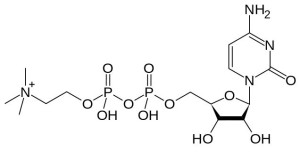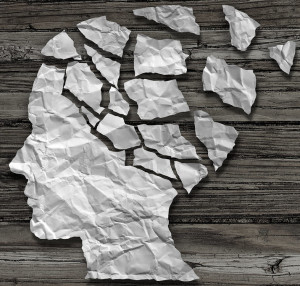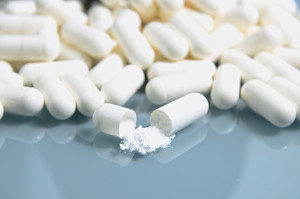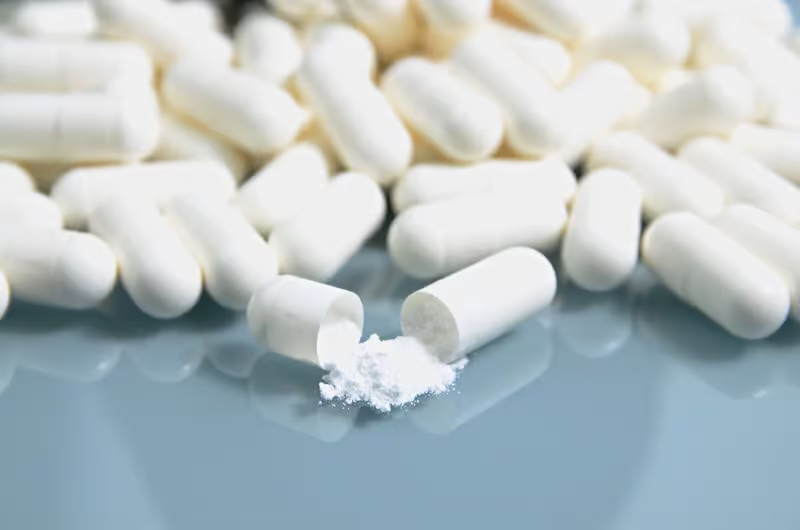Table of Contents
CDP-Choline (Cytidine Diphosphate Choline or cytidine 5′-diphosphocholine) is also known as Citicoline. This naturally occurring choline source is present in every cell in your body.
CDP-Choline is unique as a choline source. Once it’s digested it separates into cytidine and choline. When it gets to your brain it converts back to CDP-Choline.
This choline is needed to synthesize the neurotransmitter acetylcholine (ACh). ACh is a primary neurotransmitter released by neurons. This electrical signaling between neurons is involved in memory, learning, cognition and recall.
Cytidine is a component of Ribonucleic acid (RNA). This molecule is involved in coding, decoding, regulation and the expression of genes. But once it gets into the brain, it converts to uridine.
The signaling going on between neurons tends to grab choline molecules from cell membranes when choline is in short supply. This is where uridine steps in. It repairs those same cell membranes. To maintain neuron integrity.
CDP-Choline helps:
- Brain Optimization: CDP-Choline provides uridine once it enters in the brain. Uridine repairs, rebuilds and re-supplies the components needed for neuron repair. To keep signaling between neurons optimized for memory, learning, cognition and recall.
- Neurotransmitters: CDP-Choline enhances the release of norepinephrine, dopamine, serotonin, and acetylcholine in the brain.[i] [ii]
- Brain Energy: CDP-Choline increases Adenosine triphosphate (ATP) in brain cells. ATP is produced in your mitochondria and your main source of cellular energy.
Overview
CDP-Choline is a type of choline that is present in every cell in your body. You can also get it from eating organ meats like liver.

Choline is considered an essential nutrient because your body uses it faster than it can produce it. So you need to supplement choline either from food or a supplement.
You need choline for the production of the neurotransmitter acetylcholine. And to form phosphatidylcholine (PC), used in building cell membranes.
In fact, choline is so vital to cognition and nerve function that, without it, we couldn’t move, think, sleep or remember anything.
CDP-Choline has the unique ability to convert to cytidine and choline once it passes through your digestive system. After it crosses the blood-brain barrier, it converts back to CDP-Choline.
The left-over cytidine in your blood can convert into uridine in your brain. Uridine is necessary for repairing cell membranes.
CDP-Choline is involved in memory and cognitive functions. And provides energy for the brain to conduct sustained mental effort.
CDP-Choline vs. Alpha GPC vs. Choline Bitartrate: What’s the Difference?
Choline is a water-soluble nutrient similar in composition to B-vitamins. CDP-Choline, Alpha GPC, Choline Citrate and Choline Bitartrate are all sources of choline.
CDP-Choline (cytidine 5′-diphosphocholine): Is about 18% choline by weight and easily crosses the blood-brain barrier. Your body naturally synthesizes choline into CDP-Choline (Citicoline) in your brain.
Taken as a supplement, it’s then converted to cytidine and choline in your gut. Once it crosses the blood-brain barrier it’s converted back to CDP-Choline. The choline then assists cell membranes, and helps create acetylcholine.
 The added benefit of CDP-Choline is with cytidine. Cytidine can convert into uridine which is critical in the brain. Uridine is needed to synthesize the phosphatidylcholine (PC) in neuron membranes. It helps repair neurons.
The added benefit of CDP-Choline is with cytidine. Cytidine can convert into uridine which is critical in the brain. Uridine is needed to synthesize the phosphatidylcholine (PC) in neuron membranes. It helps repair neurons.
Choline Bitartrate: An economical form of choline, and about 40% choline by weight. So 1 gram of Choline Bitartrate offers 400 mg of actual choline. It does not easily cross the blood-brain barrier. So you won’t experience the same level of nootropic benefits as with Alpha GPC or CDP-Choline.
Alpha GPC: About 40% choline by weight and easily crosses the blood-brain barrier. Alpha GPC naturally occurs in your brain as a byproduct of phosphatidylcholine (PC). When your brain needs more choline, and the choline floating around in your brain is running low, it breaks down PC from cell membranes. And turns it into Alpha GPC.
Your body and brain loves it when you use Alpha GPC. Because it doesn’t have to cannibalize its own cells to get more choline.
How does CDP-Choline Work in the Brain?
CDP-Choline boosts brain health and function in several ways. But two in particular stand out.
- CDP-Choline is metabolized in the gut wall and liver to form choline and cytidine. Once choline and cytidine cross the blood-barrier they re-synthesize back into CDP-Choline (Citicoline).[iii]
In the brain choline aids in the synthesis of acetylcholine. And the release of dopamine.[iv] Acetylcholine is a neurotransmitter associated with memory and learning.
- CDP-Choline helps repair neural membranes. Choline is a precursor to the neurotransmitter acetylcholine (ACh) in your brain. ACh carries nerve impulses across synapses. And then is broken down by enzymes.
ACh is then reassembled for reuse. But this breakdown/reassembly process isn’t foolproof. Some ACh gets lost in the process. So your brain goes looking for more choline to make ACh.
If there isn’t enough choline in your blood, it gets it from the phosphatidylcholine (PC) that makes up the outside of the cell membrane of your neurons. The PC in the cell membrane releases choline to help make acetylcholine.
When your neurons lose too much choline, they lose integrity. Nerve impulses break down, and cognitive abilities decline.[v]
 Scientists in the lab at MIT showed that this is where uridine steps in. The cytidine in CDP-Choline converts to uridine in your body. And it works as a bridge between choline and neuron membrane synthesis.
Scientists in the lab at MIT showed that this is where uridine steps in. The cytidine in CDP-Choline converts to uridine in your body. And it works as a bridge between choline and neuron membrane synthesis.
Uridine is needed to synthesize the PC in neuron membranes. It is first converted to CDP-Choline. Which is then synthesized into new PC. This new PC can then repair damaged neuron membranes. Membranes that were raided to make acetylcholine.[vi]
How things go bad
As we get older, our brain chemistry and energy metabolism changes. This can happen at any age once we enter our adult years.
↓ Brain cell membranes degenerate
↓ Recall, reaction time and mood diminish
↓ Acetylcholine levels decline[vii]
All of these changes can happen at any age. And our bodies are influenced by the food we eat, what we drink, lifestyle habits, the air we breathe and more.
So CDP-Choline can help for age-related cognitive decline, as well as a student looking to do better in school. By boosting acetylcholine and dopamine. And rebuilding neurons in the brain.
CDP-Choline benefits
Research from hundreds of studies have shown that CDP-Choline will:
- Boost cognition[viii]
- Increase brain energy and speed up formation of brain membranes[ix]
- Boost production of acetylcholine[x]
- Increase blood flow in your brain[xi]
- Offset the harmful effects of stroke[xii]
- Improve memory and learning ability[xiii]
- Boost cognitive performance and memory in Alzheimer’s patients[xiv]
CDP-Choline is water-soluble and quickly enters your brain after you take it. In fact, studies show it has nearly 100% bioavailability in your body. Take it orally or intravenously and your body absorbs the same amount.
Once in your brain it boosts signal transmission, and repairs neurons. CDP-Choline improves your brain function and memory by directly increasing levels of acetylcholine and dopamine. And repairs neurons at the same time.
How does CDP-Choline feel?
The most profound indication of the power of this supplement is with those who have suffered a stroke.
Stroke survivors report that after continued usage of CDP-Choline, most of the noticeable effects of the stroke are gone. Including muscle paralysis and weakness.
 Neurohackers report they are better able to concentrate and focus. And experience a significant boost in cognition.
Neurohackers report they are better able to concentrate and focus. And experience a significant boost in cognition.
You can feel more mentally alert. And you may even ease the fatigue associated with clinical depression by using CDP-Choline.
Some use CDP-Choline as an alternative to the stimulants prescribed for ADHD.
CDP-Choline Clinical Research
In a study at the University of Utah, 75 healthy males were given 250 mg, 500 mg of CDP-Choline, or a placebo. Tests were recorded after 28 days of supplementation.
The adolescent males receiving 250 or 500 mg of CDP-Choline showed improved attention and psychomotor speed. And reduced impulsivity compared to adolescent males who received placebo.
This study indicates CDP-Choline is effective even in younger age groups. And can be particularly helpful to those dealing with ADHD.[xv]
CDP-Choline Enhances Cognition
A study published in Food and Nutrition Sciences assessed the potential cognitive-enhancing effects of Citicoline (CDP-Choline) in healthy, adult women.
This double-blind, randomized, placebo-controlled trial worked with 60 healthy women from 40 – 60 years old. Each volunteer was given a daily dose of 250 mg or 500 mg of Citicoline, or a placebo for 28 days.
The women who took either dose of Citicoline for 28 days showed a significant improvement in cognition.
The researchers suggested that Citicoline may improve attentional performance in middle-aged women. And it might eliminate the attention deficits associated with central nervous system disorders (i.e. ADHD).
CDP-Choline Improves Memory
Researchers in Japan studied 16 men and women who were given either 500 mg or 2000 mg of Citicoline for 6 weeks. Magnetic resonance spectroscopy (MRS) was used to study the brains of the participants at the end of the study.
The research team found ATP in the neurons of those in the study increased by over 14%. And membrane phospholipids were boosted by over 32%. These finding were in specific areas of the brain associated with cognition. And the effect was even more pronounced in the group that received the lower dose of Citicoline.
The researchers concluded that Citicoline supplementation could help prevent cognitive decline associated with aging. Along with an increase in brain energy reserves and utilization. And an increase in the components needed to synthesize and maintain cell membranes.
CDP-Choline Recommended Dosage
Recommended CDP-Choline dosage is 250 – 500 mg per day. Taken no more than twice per day. Two daily doses would be one CDP-Choline dose in the morning, and one in the early afternoon.
If you’re adding CPD-Choline to your stack with a racetam, a typical ratio would be 250 mg of Citicoline to 1 gram of Aniracetam or 4 grams of Piracetam.
CDP-Choline Side Effects
Recommended dosages even for extended periods are considered well-tolerated and safe. While CDP-Choline is considered non-toxic, it is possible to experience toxicity with too much choline in your body.
If you experience trouble sleeping, headache, diarrhea, low or high blood pressure, nausea, blurred vision or chest pain – you should stop using CDP-Choline.
Type of CDP-Choline to Buy
 CDP-Choline is sold in capsule and powder form. Capsules are usually 250 – 500 mg each. 500 mg of CDP-Choline in powder form is equivalent to 2-level 1/8 tsp scoops.
CDP-Choline is sold in capsule and powder form. Capsules are usually 250 – 500 mg each. 500 mg of CDP-Choline in powder form is equivalent to 2-level 1/8 tsp scoops.
Cognizin® is a patented, allergen-free, and water-soluble form of CDP-Choline shown in clinical trials to boost brain cell membrane formation by 26%. And increase brain energy by 13.6%.[xvi]
CDP-Choline is often found in pre-formulated nootropic stacks. But as Cognizin® is only offered in premium stacks.
You get an effective 250 mg Citicoline in Click for Mind Lab Pro® including effective doses of 10 brain enhancing nootropic compounds.
I recommend Mind Lab Pro® because it addresses all aspects of anxiety, memory and cognitive enhancement, stabilizes mood, brain repair, and maintenance. See my full Mind Lab Pro review for more.
Nootropics Expert Recommendation
I recommend using CDP-Choline as a nootropic supplement.
CDP-Choline is brain food. And is a natural substance found in every cell in your body.
You can get choline from some of the food you eat. But adequate levels of CDP-Choline are only found in organ meats like liver. So to get its benefits you must take it as a supplement.
CDP-Choline is vital to maintaining optimal brain health. And has been shown to increase cognitive energy, boost brain function, enhance communication between neurons, and protect neural membranes from free radical damage.
You get an effective 250 mg Citicoline in Click for Mind Lab Pro® including effective doses of another 10 brain enhancing nootropic compounds..
I suggest supplementing 250 – 300 mg twice per day. And CDP-Choline is a great compliment to a stack including any nootropic from the racetam-family. Anything that causes an increase in uptake of acetylcholine in your brain.
You need to provide your brain with the CDP-Choline it is demanding. Or it starts cannibalizing your own brain cells to make more acetylcholine. Signs that you’re lacking adequate choline are headaches.
When using CDP-Choline with one of the racetams start with a ratio of 1:4. For example, 250 mg of CDP-Choline to 1,000 mg of Aniracetam.
Stroke survivors may want to up the dose to 2,000 mg per day.
I use and recommend Click for Mind Lab Pro® which includes effective doses of 11 brain enhancing nootropic compounds including 250 mg of Citicoline.










Join The Discussion - 297 comments
Elmer
November 25, 2021
I am wondering about taking CDP Choline or Alpha GPC and the prostrate. I have read that choline increases the size of the prostate, and because of that men should not eat more than one egg per week. And considering I am over 60.. what potential harm or effect does this increase in choline by taking 1 or 2 capsules of CDP Choline or Alpha GPC or both per day, pose for us men with our prostate?
David Tomen
November 28, 2021
Elmer, there is no conclusive evidence that choline causes or increases the risk of prostate cancer. In fact, the studies vary from one end to the other and are inconclusive.
Researchers at Nanjing Medical University did a meta-analysis of all available literature on this subject in 2016. And concluded that “choline and betaine consumption lowers cancer incidence in this meta-analysis, but further studies are warranted to verify the results.” https://www.nature.com/articles/srep35547
Jason
November 13, 2021
Hello David,
I have trouble getting CDP Choline it’s always out of stock, can I use phosphatidylserine instead?
David Tomen
November 16, 2021
Jason, if you cannot get CDP-Choline you are better off using Alpha GPC because both help increase acetylcholine but come in at different parts of the acetylcholine synthesis pathway.
PS is not a direct substitute because it can’t directly provide a choline molecule for acetylcholine synthesis like the other two can.
Tom
October 1, 2021
Hi David
Is choline something that should be avoided with anxiety based repetitive thoughts (OCD) – or is this a nootropic you’d recommend one tries?
David Tomen
October 2, 2021
Tom, choline should not be a problem. For OCD try: Lemon Balm, Saffron, Taurine, L-Glutamine, Uridine Monophosphate, Glycine or Valerian. See my reviews for each of these and choose a couple to try.
Dean
December 29, 2021
What about Lithium for OCD?
David Tomen
December 29, 2021
Dean, there are very few studies showing Lithium to help with OCD. But the authors of this study (https://www.nature.com/articles/s41398-021-01329-3) conclude that “low dose lithium” may help OCD symptoms. Low dose lithium = Lithium Orotate so it’s worth a try.
Marcie Webber
August 28, 2021
Just for clarification after having experimented myself supplementing extra dose when taking MLP and Aniracetam.
Rec dose 250-500mg/day. Yet using racetam increase dose going beyond rec. dose.
8A MLP ; CDP Nutricost 300mg
Aniracetam 1g (HR)
4p CDP 300mg
Aniracetam 500mg (Total Citicoline 550mg/day.)
Personally I am not sure whether these are working but I believe with all my heart it does what it does. Give it time. I do sometimes fell asleep for 1h after this in AM stack . Funny wakes me up in an hour like i took a nap.
Now I am switching to brand Cognizin Bestvite used in the studies but available only in 500mg caps. Maybe @ this time switch around.
500mg with MLP AM &
4p 1G Ani( later dose) with Bestvite 500mg
Question: Therefore Ok to dose Citicoline > than rec dose with racetams?
But how much is too much? Will I gauge with the side effects as mentioned for safety? Is there more harm it causes if too much beyond SE mentioned?
Thank u for your thoughts.
David Tomen
August 28, 2021
Marcie, I’m not sure what you are asking here. But if your question is about the right amount of Citicoline with Aniracetam – if you get a headache after taking Aniracetam it means that you didn’t use enough Citicoline and you need to increase your dose. It’s called a racetam-headache which happens when you use a racetam but do not provide enough choline when using it.
Noah
August 23, 2021
How much CDP Choline would you suggest taking with Modafinil? Many claim to take it to avoid the headaches, that come from modafinil. I take 250mg of CDP choline in the am with modafinil but end up getting headaches later on in the day. Would you suggest bumping it to 500mg CDP Choline a day?
David Tomen
August 24, 2021
Noah, you can try bumping it up to 500 mg but it would be better to use 250 mg CDP-Choline in the morning and another 250 mg at noon. If you still get a bit of a headache do a 3rd dose around 4 PM. You’re dealing with a short half-life here so 2 or 3 doses during your day is better.
Jason
August 20, 2021
Hi David
Does cdp-choline only benefits the brain only or it is also use by the liver?
David Tomen
August 20, 2021
Jason, CDP-Choline is also beneficial to liver health: https://www.ncbi.nlm.nih.gov/labs/pmc/articles/PMC6683073/
Christopher Drennen
August 5, 2021
A lot of nootropics increase acetylcholine. Do I need more choline if I am already taking phosphatidyl choline and phosphatidyl serine? I had begun taking huperazine A until I heard that it could be bad for my kidneys. Last week my creatinine level was tested at 1.45 which is up from 0.88 less than a year ago. How much choline is too much and can any of these supplements affect kidney function? Are there any that I should definitely avoid? (I also take taurine, omega 3, bacopa, rhodiola, lions mane, tryptophan, gaba, and mucina.)
David Tomen
August 7, 2021
Christopher, “how much is too much choline” depends entirely on what your system needs. Only you can determine that. The amount of Alpha GPC, Citicoline, and Phosphatidylserine I use is likely far higher than what most can use. But my system is desperate for it.
Clues that you are using too much choline include trouble sleeping, feeling sleepy after you take it, headache, diarrhea, low or high blood pressure, nausea, blurred vision or chest pain.
Christopher Drennen
August 7, 2021
Thanks a lot for the response. Do you know anything about how these supplements affect kidney function? My creatinine level indicates chronic kidney disease, which is quite alarming because I never had any problem with that until this year. I just needed to know if any of the stuff I am taking (see list above) could be part of the problem.
David Tomen
August 8, 2021
Christopher, the only thing on your list that may negatively affect kidney function is Huperzine-A. The rest of your stack should not negatively have an effect on your kidneys unless you 1. are using too much of any of those supplements, or 2. you are dealing with some type of kidney dysfunction that either you were not aware of or that may have been aggravated by those supplements.
And check to make sure your dosage of each of those supplements is within my recommendations and not any higher than the maximum dose.
Mick
July 28, 2021
Ok David,
Now I know more ways to check the quality of a nootropic.
Thanks a lot!